Now going on 19 years, the extensive gardens at Ocean Forest Ecolodge harbor hundreds of species of native and rare ethnobotanical treasures from Central and South America as well as the Asian Tropics. These include fruit trees that guests enjoy seasonally, aromatic herbs, medicinal plants and detox bitters that are served in teas at lunch and dinner. Our permaculture gardens produce a seasonal abundance of food, vegetables and spices. Here is an overview of just some of our leafy friends, swaying in the jungle breeze.
Trees
|
Ylang-Ylang Ilan |
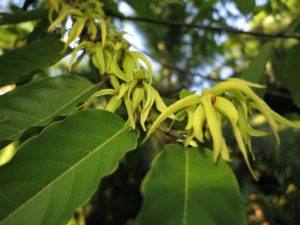 |
Cananga odorada |
The sweet-scented oil obtained from the flowers is used in perfumery and aroma therapy. Native to tropical Asia |
|
Caña Fistula Golden Shower |
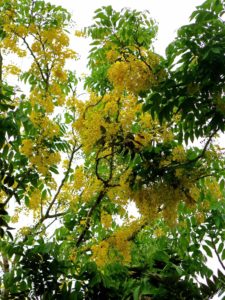 |
Cassia fistula |
Abundant yellow flowers cover its canopy and long black hanging pods are its fruits. Used in ethnomedicine as an intestinal purge. |
|
Cannoball tree Llustinda Watí’tsantsá Pankabukabu |
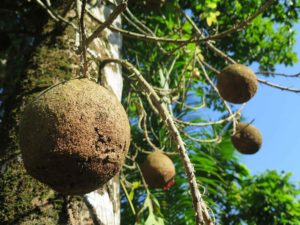 |
Couroupita guianensis |
Native to the upper Amazon, this majestic cauliflorus tree is highly medicinal. A bark tea serves for lung ailments, and the fruit pulp for fungal infections. |
|
Sugar Powder Guapinol Söhó |
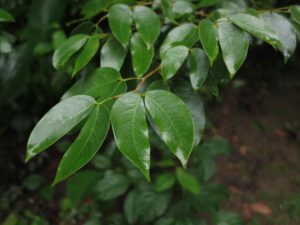 |
Hymenea courbaril |
A large forest tree considered sacred among indigenous peoples. Highly medicinal for renal and prostrate conditions. Sap is used as an incense and is the source of all new world amber. |
|
Rain Tree Cenizaro |
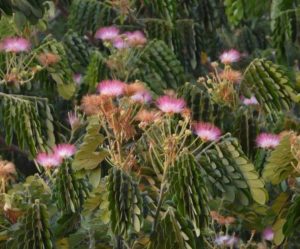 |
Samanea saman |
A large tropical tree with grooved trunk and pink flowers. Cicadas love this tree whose high pitched shrills mimic the sound of rain. Native to tropical America. |
|
Pau de Arco Roble Savanna |
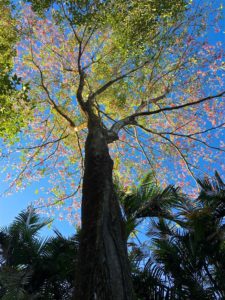 |
Tabebuia rosea |
Her showy pink blossoms flower during the dry months filling the landscape with color. The bark of this tree is a revered medicine used for a wide array of ailments, serving as an adaptogen. |
>
Fruit Trees
|
Cashew Marañón |
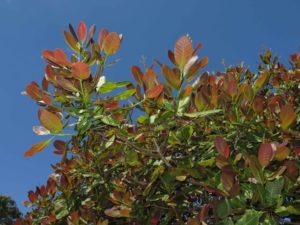 |
Anacardium occidentale |
The cashew famed for its nut, is originally from the upper Amazon. It has a juicy its fruit that ripens in March and April. Her leaves are highly medicinal and serve to treat diabetics. |
|
Guanabana |
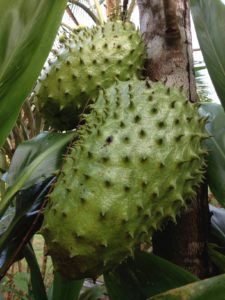 |
Annona muricata |
A medium sized with tree aromatic leaves with large fruits, whose inner white pulp makes for amazing juice rich in antioxidants and flavor. Her leaves are highly medicinal and used in cancer therapy. |
|
Mangosteen Manggustan |
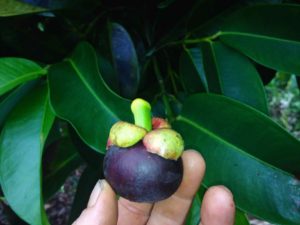 |
Garcinia mangostana |
A legendary fruit with tangy sweet white pulp encased in a thick marron colored rind. Native to Tropical Asia. |
|
Piton Soda Cantsë Wengaka |
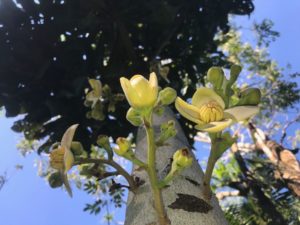 |
Grias neuberthii |
An Amazonian native with long leaves, whose fruits grow on the trunk, has yellow flowers that smell like wood glue. The oily pulp from its oblong large fruits is an important source of food for people and wildlife. Medicinal for lung ailments. |
|
Pasu Nonginka |
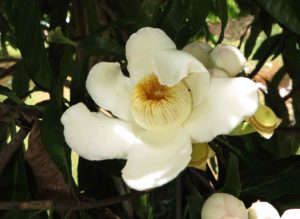 |
Gustavia longifolia |
A graceful tree with large showy white flowers similar to magnolias in appearance. Its large round fruit has an oily flesh similar to Avocado, yet orange in color! |
|
Mango |
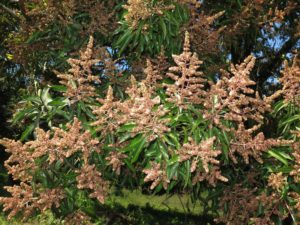 |
Mangifera indica |
Originally from India this tree has adapted itself well to the Costa Rican tropics. Fruits begin to appear in April and go through June. Green mango juice cleanses the lungs and ripe mango juice cleanses the blood. |
|
Rambutan Mamón Achiotillo |
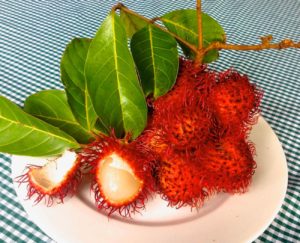 |
Nephelium lappaceum |
A red plum-sized fruit with soft spines and slightly acidic taste, native to tropical Asia. Here they are called mamón, meaning ‘suck on it’ |
|
Cacao Cacao criollo |
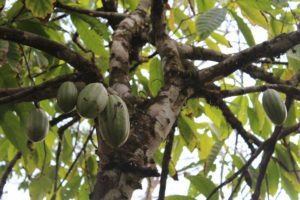 |
Theobroma cacao |
From its fermented and roasted seeds chocolate is produced. A highly revered, world famous, food and medicine tree with a subtle planetary mission. Native to central and south America. |
Palms
|
Coconut Pipa |
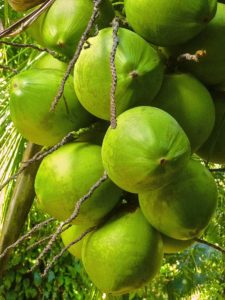 |
Cocos nucifera |
The beloved coconut grows here in abundance and there are several varieties. Filipita is a small palm with green nuts and sweet water, Chocuano is a towering palm with giant nuts used for making different types of medicine. Criollo is a native palm that grows on the beach best for making oil. |
|
Home Coyol American Oil Palm |
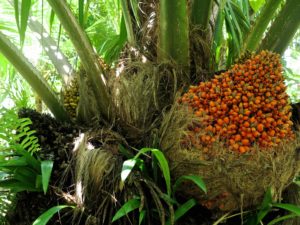 |
Elais oleifera |
A native, low growing oil producing palm that produces abundant racemes of bright orange colored fruits that is an important source of food for wild life. and from which cooking oil can be obtained. |
|
Asaí Açai Wigonzá Purasai |
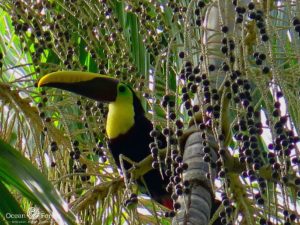 |
Euterpe oleraceae |
An elegant central and south American palm tree that produces small edible blackish purple berries used to make an antioxidant rich and flavor-filled drink. |
|
Aguaje Morete Në’é |
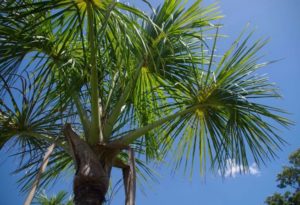 |
Mauritia flexuosa |
A large elegant palm native to the Amazon. It produces an abundance of fruits, from which a highly nutritious drink is made. Humboldt called it the ‘Tree of Life’ |
Banana Trees
|
Cuadrado Saba Banana |
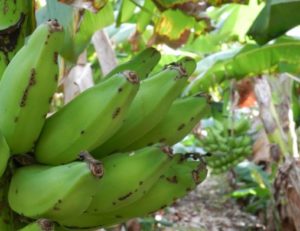 |
Musa sp. |
A robust and stocky banana whose fruits have flat sides reason why it’s called cuadrado, meaning - squared. |
|
Guineo Rojo Ma’nonka Red Fe’i Banana |
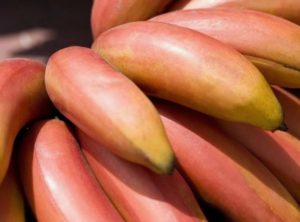 |
Musa sp. |
This red variety is a short stocky banana fruit, it is medicinal for dysentery. It is also very sweet and can be eaten raw. |
|
Orito Datíl Little Golden |
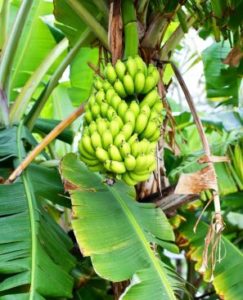 |
Musa sp. |
A small golden yellow variety of banana that is very sweet and can be eaten green cooked or eaten raw when ripe. |
|
Plantain Platano |
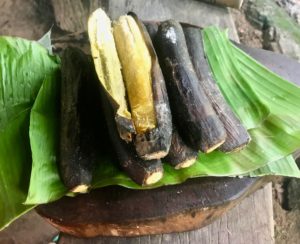 |
Musa sp. |
This pygmy variety has large cooking plantains that are used green to make pátacones (mashed and fried) and mazamorra, grated into soups. Ripe they are great for making chucula banana gruel. |
Aromatic Herbs and Teas
|
Lemon Verbena Juanilama |
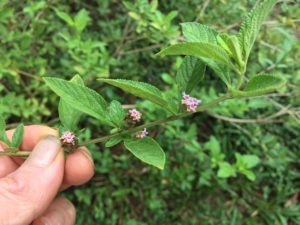 |
Aloysia triphylla |
A shrub of the verbena family with lemon scented leaves used in flavoring and to make tea. Native to central and south America. |
|
Cinnamon Canela |
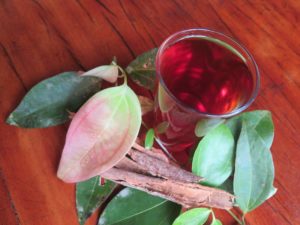 |
Cinnamomum zeylanicum |
Famous for its sweet spicy and complex aroma, cinnamon bark is not just an important spice, yet also and important medicine. |
|
Lemon Grass Zacate Limon Hierba Luisa |
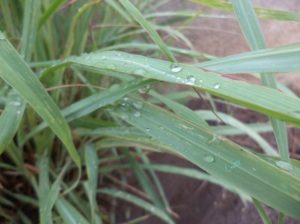 |
Cymbopogan citratus |
A fragrant tropical grass that yields an oil that smells similar to lemon, used for tea, perfumery, as a medicine and in aroma therapy. |
|
Guayusa |
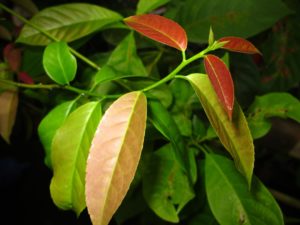 |
Ilex guayusa |
From the leaves of Guayusa, a hierba maté relative native to the upper Amazon, a rich full-bodied tea packed with antioxidants is made. Its aromatic tea is revered as a longevity tea and the Guayusa tree amazing outlives all other trees, growing to thousands of years in age. |
|
Tilo Carpenters Bush Piri piri |
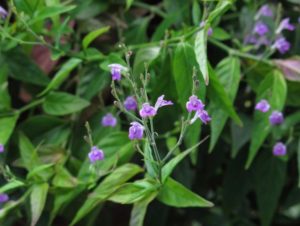 |
Justicia pectoralis |
A small aromatic herb, whose leaves make for a great tea similar to chamomile. Also used as a medicinal plant in ethno-medicine and perfumery. |
Medicinal Plants
|
Bilimbi |
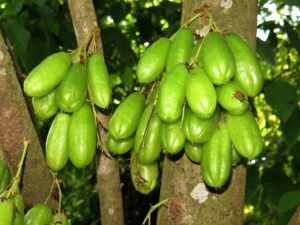 |
Averroha bilimbi |
Known as the cucumber tree, it has sour fruits that hang from the trunk, used to make sauces. |
|
Yagé Ayahuasca Pínde |
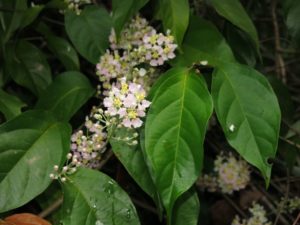 |
Banisteriopsis caapi |
Sacred bitter entheogenic vine of South American peoples, steeped in mythology and oral tradition. |
|
Borajo |
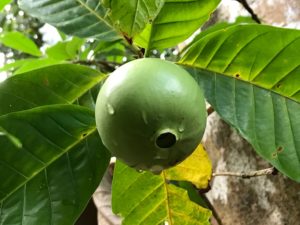 |
Borojoa patinoa |
A small native tree of the Amazonian rainforest, whose large round fruits when ripen is added to fruit drinks as a supplemental source of potassium. |
|
Cruz Caspi |
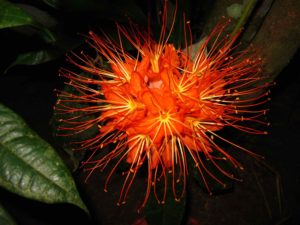 |
Browneopsis sp. |
A small understory Amazonian tree with showy red flowers used in all types of women’s medicine. |
|
Saragundi |
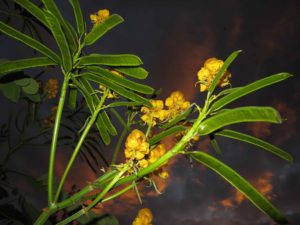 |
Cassia reticulata |
A small native tree with beautiful yellow flowers, used as an effective cure for all types of skin rashes and infections. Its seeds are much appreciated by parrots. |
|
Gourd Jicara Pilche |
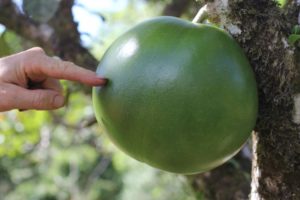 |
Crescentia cujete |
Steeped in mythology and practicality, the hard-shelled fruits of the gourd are used among indigenous peoples all over central and south America as food utensils. Medicinal. |
|
Dunduma Yiyo Nuní |
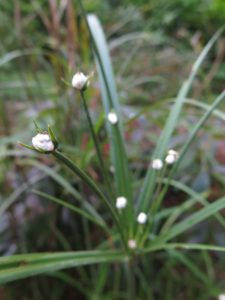 |
Cyperus sp. |
An ancestral cultigen from the upper Amazonian, whose aromatic tuberous roots are used in the treatment of anemia |
|
Life Everlasting Chugrillullu Hoja de Aire |
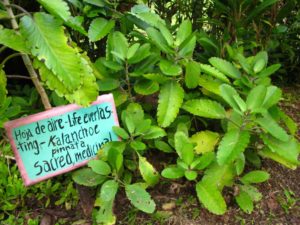 |
Kalanchoe pinnata |
This small native succulent grows wild near the beach and is also cultivated for its medicinal properties. Used to heal sprains and bruises and for a wide array of complex illness. |
|
Noni |
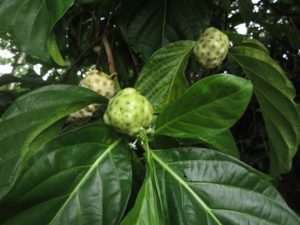 |
Kalanchoe pinnata |
This small native succulent grows wild near the beach and is also cultivated for its medicinal properties. Used to heal sprains and bruises and for a wide array of complex illness. |
|
Gavilana Jack-ass-bitters |
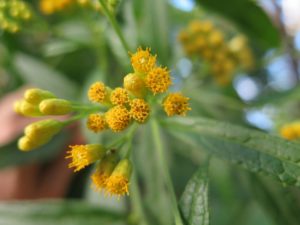 |
Neuroleana trilobata |
An extremely bitter juice extract from this native plants leaves is used as a liver tonic and as an antiparasitic. |
|
Chacruna Amiruka panga Samairuku |
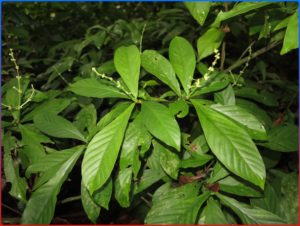 |
Psychotria virdis |
Name means ‘bridge people’ or ‘old wisdom.’ Used as an add mixture in the preparation of the sacred indigenous ayahuasca brew. |
|
Bitter Wood Hombre Grande |
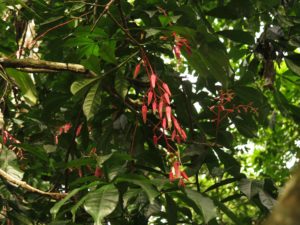 |
Quassia amara |
A native Costa Rican understory tree with fuchsia colored flowers. Its bark is extremely bitter. Used to improve digestion and liver health. |
Culinary Herbs
|
Chaya Tree Spinach Chicasquil |
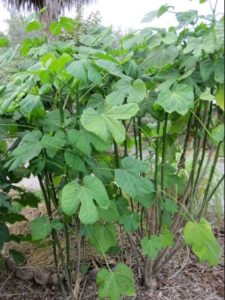 |
Cnidoscolus aconitifolius |
An edible green from Asia whose large trilobed leaves are steamed to make a food similar to spinach, highly nutritional. |
|
Garlic Vine Ajos Sacha Bejuco de Ajo |
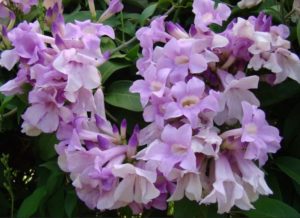 |
Mansoa alliacea |
Native to the Amazon, this wild and cultivated vine has a strong garlic odor. Its leaves are used for steaming fish; juice from its bark rasping is added to soup much like garlic. Highly medicinal. |
|
Oregano Oregano Criollo Wild oregano |
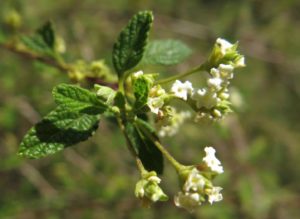 |
Lippia graveolens |
An aromatic plant whose leaves are used fresh or dried in cooking as a spice and as a medicine for colic, cramping and tummy aches. |
|
Catuk Sweet-leaf Spinach |
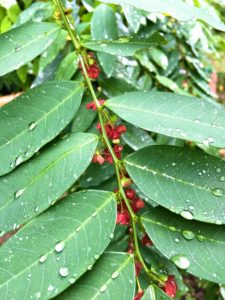 |
Sauropus androgynus |
An edible green from Asia whose small oblong, highly nutritional leaves are steamed for food and used similar to spinach. |

